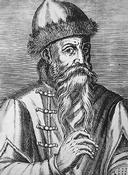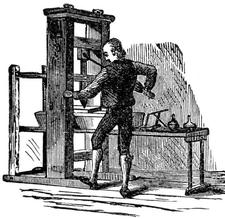Why We Should Thank Johannes Gutenberg
 It is unlikely that Johannes Gutenberg thought a great deal about the impact he would make when he began working on the printing press. While he was no doubt a highly intelligent individual, Gutenberg was really just trying to make printing more efficient and affordable.
It is unlikely that Johannes Gutenberg thought a great deal about the impact he would make when he began working on the printing press. While he was no doubt a highly intelligent individual, Gutenberg was really just trying to make printing more efficient and affordable.
In 1452, with his basic press in place, Gutenberg began his famous Bible project. Gutenberg printed 200 copies of his two-volume Gutenberg Bible. This Bible had no page numbers and no table of contents but every copy was a part of something completely revolutionary.
The Gutenberg printing press could produce up to 3,600 pages per day. By comparison, standard hand-copying techniques of the day could average around three pages per day. By 1500, printing presses in operation throughout Western Europe had produced more than twenty million volumes. By the end of the 16th century, this output rose tenfold. The printing press had ushered in the first era of mass communication.

For the first time in history, there was an unrestricted flow of information and ideas. Europe exploded into a rapid evolution of social, political, and intellectual thought. A sharp increase in literacy amongst European laypeople broke the control the literate elite had on education and learning. European languages flourished and Latin was no longer the only language used in scripture and books. The written word was now accessible to all and the power of political and religious authorities quickly waned.
The printing press brought with it a new philosophy of the importance of learning and access to information. It brought interest back to scientific matters, government, rhetoric, philosophy, and art. This attitude has carried itself over 450 years into our present-day society and influenced human civilization. The printing press is the grandfather of the radio, the telegraph, the telephone, the television, the cell phone and yes, even the Internet.
And we here at Springfield-Greene County Library can thank Mr. Gutenberg for giving life to modern librarianship. With millions of books being printed around the world, a profession became necessary to store, organize, preserve, and distribute the new influx of information. A more literate public both demanded and expected access to knowledge. The ethics of modern librarianship are rooted in the ideal that information should be free for all. Libraries are a direct reflection of every revolution the printing press brought about.
So next time you sit down with a good book, take a minute to remember Mr. Gutenberg. For without him, we might still be waiting on James Patterson to hand-write a single copy of his latest bestseller! (And wouldn't that hold list be long?)
While you're at it, check out these great titles about the history of books and printing:
Books : A Living History by Martyn Lyons
A Social History of the Media : From Gutenberg to the Internet by Asa Briggs
How the Bible was Built by Charles Merrill Smith
Library : An Unquiet History by Matthew Battles.
The Smithsonian Book of Books by Michael Olmert
Find this article at http://thelibrary.org/blogs/article.cfm?aid=2327&lid=0&view=print